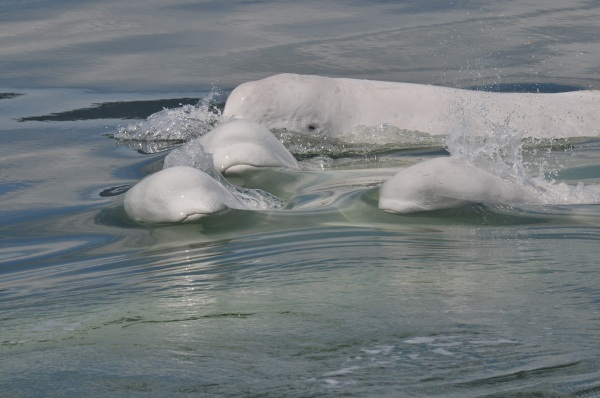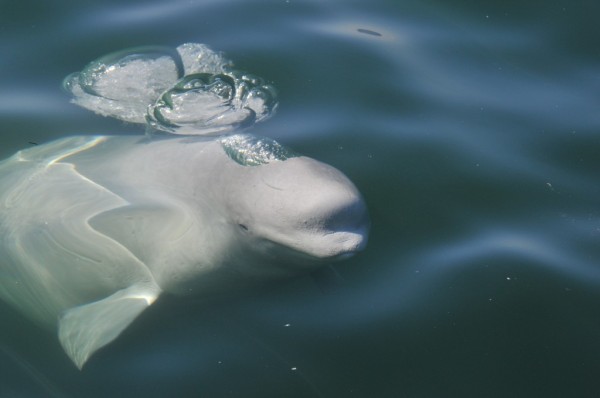Endangered St. Lawrence Belugas and the end of an oil port project
St. Lawrence Belugas – and all citizens who rallied for months for their protection – can now take some well-deserved time to unwind. Earlier this week, the Committee on the Status of Endangered Wildlife in Canada (COSEWIC) issued a recommendation to alter the status of this small population of beluga whale, downlisting it from “threatened” to “endangered.” This prompted Quebec Premiere Philippe Couillard to issue a VERY strong hint that developer TransCanada should look for alternative sites for its oil port, which would route oil sands bitumen to external markets.
Protests against the proposed terminal peaked months ago, with citizens, commentators and environmental groups sharply criticizing TransCanada’s plans for Cacouna. A big part of the opposition came from the company’s decision to ignore the best available science and move ahead with plans to build the Energy East pipeline terminal in part of the Gulf of St. Lawrence that’s a known gathering place for female beluga whales and their young. This is habitat that’s essential for the survival of an endangered species.
In September 2014, WWF supported a lawsuit initiated by Nature Québec, the David Suzuki Foundation and the Canadian Parks and Wilderness Society, and conducted by the Quebec Environmental Law Centre. The suit resulted in the Quebec Superior Court ordering the suspension of TransCanada’s exploratory drilling, which had been previously authorized by Ottawa and the government of Quebec. The court ruled that Quebec’s Ministry of Sustainable Development, Environment and the Fight against climate change authorized drilling without obtaining proper scientific analysis from Fisheries and Oceans Canada. The court severely criticized the minister for the incomplete analysis, ordering that work be suspended on the project until 15 October.
Subsequently, TransCanada’s encountered further delays when drilling was again suspended due to noise tests that revealed it was exceeding an established 120 decibel limit. The Quebec government then demanded that the company submit a new work plan that clearly showed compliance with underwater noise regulations.
TransCanada did not reach compliance, and the company’s work authorization certificate expired on the 30th of November. Drilling has not resumed.
Science won the day, but are policymakers listening?
The status change for St. Lawrence belugas comes as no surprise to experts. This small beluga population is one of the most studied in the world, and top scientists have contributed to a beluga recovery strategy that falls under Canada’s Species At Risk Act for over three decades. But despite these efforts, we’re still seeing a decline in the St. Lawrence beluga population. It now stands at only 900 individuals.
The Canadian government has completely failed in its legal obligations to protect the St. Lawrence Beluga under the Species At Risk Act! This failure allowed TransCanada to gain the permission it needed to start work in Cacouna. Imagine the time and energy that could have been saved if procedure had been followed. Hopefully, the “endangered” classification will lead to formal designation of the beluga’s critical habitat.
For the past 15 years, Fisheries and Oceans Canada has been studying the possibility of creating a Marine Protected Area (MPA) on a portion of the St. Lawrence Estuary covering almost 6,000 km2, an area roughly the size of Prince Edward Island, and stretching from Rivière-du-Loup, Cacouna and L’Isle-Verte. This area, the first in Quebec, would aim to protect the habitat of the St. Lawrence beluga and the many other marine mammals that live there.
In light of the new circumstances, an MPA seems entirely appropriate. We hope the government will act quickly to make this happen.
The future of the St. Lawrence beluga?
The big question we need to answer now is: what can we do to help this endangered species survive? There’s a lot to learn. We still don’t have a clear picture of St. Lawrence belugas’ wintering conditions, but we think they might be suboptimal. Also, we need to find out if climate change is affecting food sources. To answer these questions, WWF is supporting a research project lead by the Group for Research and Education on Marine Mammals (GREMM), which aims to better protect this wonderful and unique species.



